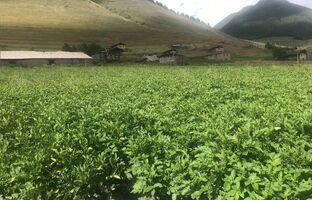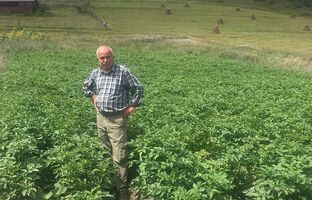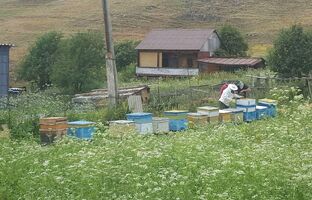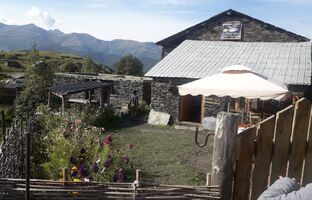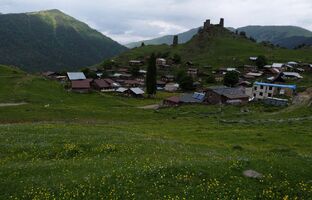In the Georgian region of Tusheti the Czech Development Agency (CzDA) has helped to kick-start sustainable economic development
In the beautiful mountain landscape of the Georgian region of Tusheti the CzDA has been helping the local inhabitants since 2010. It has provided many of the households here with solar panels and has supported of the projects focused on sustainable forestry management, the provision of health care and emergency rescue services and the economic development of the region in the fields of tourism and agriculture. In one of its projects it has focused specifically on the development of the traditional livelihood of the Tusheti farmers, which particularly comprises growing local crops, including the introduction of hardier varieties, modern farming techniques and processing sheep’s wool.
The remote mountain region of Tusheti lies at a height of almost three thousand metres above sea level and can only be reached via the Abano pass. It is inhabited only from May to October, as during winter there is not a single road leading here that is passable. The main source of livelihood for the local people is tourism, followed by agriculture, as well as grassland farming in the Pirikiti and Cova valleys. Although the number of tourists here is increasing every year, the local inhabitants continue to make their living in the traditional ways, i.e. mainly by growing potatoes and processing sheep’s wool. “The main problem here was a lack of demand for wool and an overall decline in the production of potatoes. The wool is also low quality, as the sheep were sheared in a variety of different ways and there was no equipment for cleaning the wool. Another major role in the decline in wool and potatoes has been that they are costly and difficult to transport on the unpaved roads connecting Tusheti with the lowlands,” says Tomáš Ďurana from Charita Česká republika, a charity that since 2015 has implemented the four-year project Support of the Traditional Livelihood Systems in Tusheti, funded by the CzDA.
The problem with the fall in the production of potatoes was caused by the low yields, mostly due to ineffective growing techniques, lack of knowledge about soil fertility and the reduction in the use of land for growing. This was also clearly related to the lack of a market for the potatoes, due to the sheer absence of any form of marketing, thus exerting retroactive pressure to cut back on production. Yet Tusheti potatoes are well known in the region and prized for their quality; however, these varieties did not mature until the tourists, and hence the sales opportunities, had decreased. Both of these problems were also closely connected to the lack of any business planning or market analysis.
“The bulk of the project that we have funded here comprised activities involving material, technical and methodological support for the development of traditional farming as a livelihood. This primarily involved growing crops such as potatoes, cucumbers and some tomatoes, as well as processing sheep’s wool in the mountainous Tusheti region. Much of this project was focused on supporting human resources, providing selected production inputs, and also coordinating sales of farm produce. Early varieties of potatoes were therefore introduced, which are now available during the tourist season. The project will strengthen the individual links of the value chain of sheep’s wool, potatoes and vegetables from primary producers, from transport, storage, processing and marketing through to the end consumer,” explains Kateřina Šimová from the Czech Development Agency, who is in charge of the project in Georgia.
From potatoes to herbs, sheep’s wool and honey
One important part of the project was the establishment of two agricultural cooperatives to secure selected production inputs and mainly to coordinate sales of farm produce. These two new cooperatives organise the purchase of potatoes from local farmers in ever increasing numbers. This has been the case with Nana and Emzar Mozaidze, who are members of the local “Tusheti 2015” cooperatives and main grow potatoes and cucumbers. As part of the project they were provided with a greenhouse, and during harvest time they pick up to 30 kilos of cucumbers a day; the potato harvest yields around 10 tons per half hectare.
Another person who has benefited from the project is Kako Bukvaidze, who lives with his wife all year round in the village of Shenako and, in addition to other activities, makes a living from growing potatoes. They used to harvest 4 tons per hectare, but now their harvest with a different variety of potatoes and more effective techniques has more than doubled to 10 tons per hectare. Besides this, through the project they were also provided with a herb drier, which helps them to preserve their aroma. They then sell these dried herbs during the year.
The local shepherds were then provided with mechanised shearing equipment containing 24 modern shearing machines. One of the people who has taught these local shepherds to use, put together and maintain this equipment is the experienced teacher Stefanie Kauschusová, who makes a living teaching sheep shearing all over the world. As part of the project the village of Alvani was provided with two automated tanks and a drier, which has greatly helped to make processing sheep’s wool more efficient and increase the volume processed.
Support has also been given to certain beekeepers, such as Irodi Bukhaidze, whom the project has provided with the necessary equipment, enabling him to expand to managing 10 hives, which yield an average of 100 kilos of honey. Like Onise Itchirauli, who began to keep bees through a small grant programme for start-up entrepreneurs listed as part of the project. In the last season he harvested 200 kilos of honey.
Sustainable “ecotourism”
Another area in which CzDA projects strive to help improve the local standard of living is tourism. A few years ago the region was visited by more than 11 000 domestic and foreign tourists, including a lot of Czechs, who have an excellent reputation here. This is not only due to the projects described above, but also due to the Czech volunteers that regularly stay here, who have marked the main footpaths and hiking trails in the region. The number of tourists is thus increasing every year, naturally accompanied by a rise in demand for accommodation. In the village of Omalo, which is the starting point for many tourists, preparations are under way to build the Marine Ghuzarauli hotel. This bold step is inspired by the success of the village’s small café “Khavitsi”, which serves local specialities and is never short of customers.
Natia Bakuridze has already got her hotel business up and running. Besides accommodation, her little hotel “Shina” also offers sweet pastries and confectionery. She also prepares special dried food for mountain hikers. There is no wonder that on booking.com her hotel has a rating of 9.2 out of 10 and she plans to expand her successful business by opening another hotel in the village of Iliaurta.
Lela Arindauli then started up a family business in the picturesque village of Girevi. Her hotel “Nadikurta” is very popular with tourists, partly due to the solar panels provided by the CzDA under the project, thus enabling her to expand the services she offers in an environmentally-friendly way to include internet, hot water and heating, thus doubling her profit. Thanks to her success her parents have also returned to their home village, after living in Russia for many years.
Kavtar Darkizanidze also spent many years abroad and for a long time it did not look like he would ever return to Tusheti. However, after many years spent in Ireland, he eventually decided to return to the now partially depopulated village of Djvarboseli and, with the support of Czech programmes, has opened the “Poshol” guesthouse.
From the stories of the Tusheti region’s farmers it is clear that one of the most effective means of helping developing countries is to support the local people in becoming independent and to show them that with their products they can support their families and develop tourism in the mountains. “I think that the main positive impact of the project is that it has changed the way of thinking and the approach in the Tusheti community, which originally was strongly resistant to any change, i.e. changes in established farming procedures or in relation to other economic activities. This change, no matter how long and difficult it might be, has helped to kick-start sustainable economic development in the remote Tusheti region and make agricultural production more efficient,” adds Kateřina Šimová.



